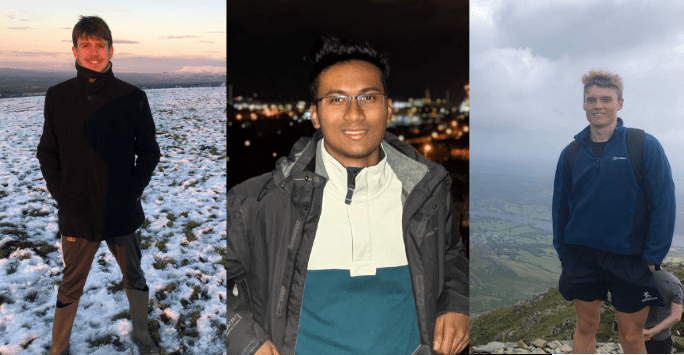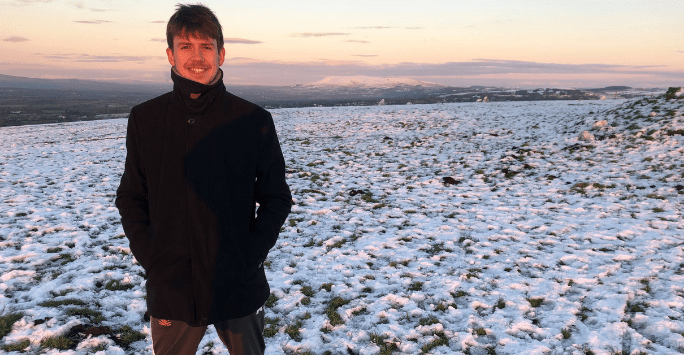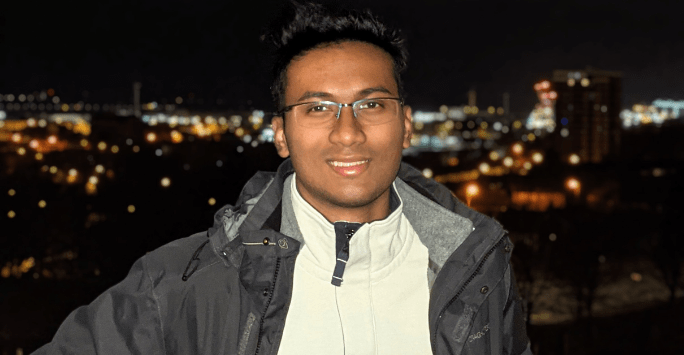
Back in September, we spoke to a group of Liverpool student doctors about to embark on intercalated programmes at the University of Liverpool, supported by Scholarship Awards from the School of Medicine. Also running this year, the Scholarships total over £60,000 in awards of between £1000 and £5000 in the form of fee waivers.
Five months on, we catch up with Dan, Alastair and Aditya on their experiences so far.
Student Doctor Dan Cooke is taking an MSc in Acute Critical and Emergency Medicine, a programme aimed at intercalating student doctors that provides the opportunity to develop in-depth applied knowledge, clinical practice and research skills in Acute Medicine, Critical Care (including ITU Medicine), Emergency Medicine and Trauma Care.
“The trauma placement at Aintree was really interesting. Teaching goes into more detail so content covered in previous years is reinforced. Meeting the deadlines for multiple research projects was initially a struggle to organise and avoid work piling up until last minute. It’s been useful to learn how to spread workload more evenly, which will definitely be helpful for finals.”
 Dan is completing an MSc in Acute Critical and Emergency Medicine
Dan is completing an MSc in Acute Critical and Emergency Medicine
Student Doctor Alastair Patefield opted for a Master of Research in Clinical Sciences, designed to develop research skills and a systematic understanding and critical awareness of the research process at the interface of basic science and clinical research.
Alastair says, “I am really enjoying working alongside students from lots of different backgrounds during my programme of study.
We all have different undergraduate degrees, some have PhDs and some are clinicians, and it is lovely hearing people's stories and future plans.
I expected my MRes programme to be like RS3 (Research & Scholarship project in Year Three of the MBChB course) but with three projects rather than one. It is similar to this when writing up the project reports but there is additional teaching for lab skills, data analysis, and critical reviewing of published studies which is interesting.
 Alastair is taking an MRes in Clinical Sciences
Alastair is taking an MRes in Clinical Sciences
I found the first term challenging with an exam and a few essays within the first few weeks of the programme. Studying was also very independent as I had picked a work from home project for my first term.
The transition from daily School staff and clinician contact to two hours a week face to face was tricky. I overcame these obstacles by revising for the exam and planning and writing essays as soon as they were set. For independent study, my supervisor's PhD student offered their help for any questions I had between supervisor meetings which helped the study style transition.”
Student Doctor Aditya Chezhian is completing a Master of Research in Biomedical Sciences & Translational Medicine which provides students with high-level research training.
“I’ve been enjoying the large amount of lab work I’ve had and being able to learn various experimental techniques such as tissue culture, immunofluorescence staining and in-situ hybridisation.
I’ve found the large amount of developmental biology theory quite complex to wrap my head around as most of the reading literature is about a lot of specific genes and cell signal pathways. I’ve had to simply ask a lot of questions!
My supervisors and people in and around the lab are always happy to answer and take the time to go over some core concepts.
I was eagerly looking forward to my programme prior to this year and have been very pleased with how the year has played out so far.”
 Aditya chose an MRes in Biomedical Sciences & Translational Medicine
Aditya chose an MRes in Biomedical Sciences & Translational Medicine
That's the story so far. What are the students most looking forward to accomplishing by the end of the academic year?
For Dan, having completed the three different research projects in the year will be the biggest accomplishment.
Submitting these will also give me all the necessary components to pursue getting published which will help build a portfolio.
For Alastair, it’s the skills that will support his ambitions in ophthalmology. “I am most looking forward to gaining skills in artificial intelligence programming by the end of the year. I already have some from my first project, but will deepen this further in my third project. This is valuable as a transferable skill to the medical specialty I would like train in later in my career.
Aditya says, “To be able to work in the lab with confidence in my skills and perhaps get a publication.”
Year Three Student Doctors are currently weighing up their options in taking a year to intercalate in 2022-23. Words of advice from Dan, Alastair and Aditya? Dan says,
Intercalation is different from the MBChB course and takes a lot of effort but if it’s a subject you’re genuinely interested in you’ll definitely enjoy it and can apply skills learnt to fourth and fifth year.
Alastair suggests, "If you are thinking of intercalating, I would say go for it if the course lets you follow a passion and you are interested in the main aspects of the course. Although medicine is our passion as future clinicians, I am really happy intercalating for the different perspectives, career prospects for specialty training and the opportunity my course brings to follow more niche passions and interests in the medical field.”
Aditya advises, “Have a good read about what the course entails, how much work you will be expected to put in and don’t hesitate to go out of your comfort zone.”
Discover More
- Interested in investing in your personal development and future career by completing an intercalated degree? The student intranet (link) and School of Medicine website (link) offer a variety of resources, including student video presentations (link) to help you make the best decision.
- Liverpool School of Medicine offers a series of Scholarship Awards to students intercalating at the University of Liverpool. See the student intranet (link) for full details, including other external scholarship opportunities (link).